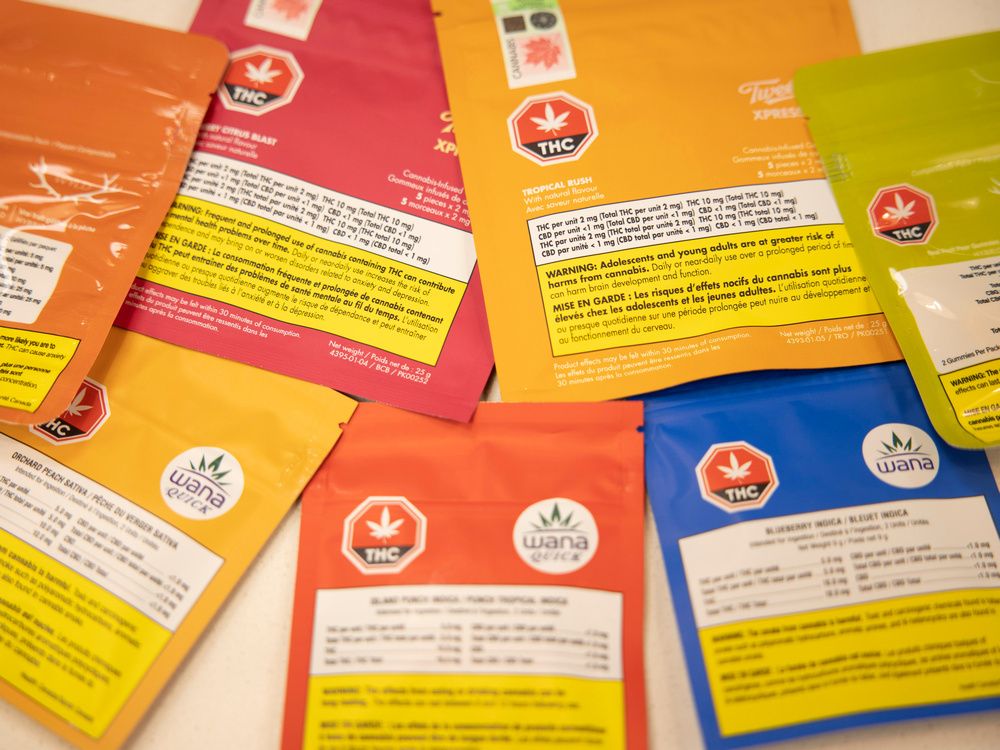Cannabis + Edibles : Child Poisoning
"Our findings suggest that restrictions on the sale of visually attractive and palatable cannabis edible products are key policy considerations for the prevention of cannabis poisonings among children in the United States and other countries considering legalization.""[Although edibles by law cannot be marketed as attractions for children and youth] they are still candy and when [an edible] comes out of packaging it is still a circular blue soft chew coated in powdered sugar -- that is candy.""As more places around the world consider legalizing recreational cannabis, we need to learn how to better protect children from cannabis poisoning.""We may need to consider other measures to reduce cannabis edibles' appeal to young children, such as much stricter limits on what edibles can look and taste like after they are removed from their packaging.""These are serious medical emergency poisoning events, and whether they have long-term impacts or whether they're an acute emergency, we want to have as few or none of these as possible."Dr.Daniel Myran, public health specialist, Ottawa"Our data indicate that legalization was associated with marked increases in hospitalizations for cannabis poisoning in children.""Most of the increase occurred after legalization of cannabis edibles and despite strict regulations aimed at reducing poisonings in children."Research study authors
 |
| After flower-based cannabis products and oils were legalized in October 2018, the study reports an average of seven children visiting the ED for cannabis poisonings per month. After cannabis edibles became available for sale in January 2020 that average jumped to 20-23 kids per month. CTV News |
"Simple safety measures and talking to kids about the dangers of cannabis edibles can help reduce the number of children visiting the hospital for cannabis-related reasons.""The children that I've seen have been primarily preschool to school age, so six and under. Sometimes I've seen multiple children even in the same shift coming in with cannabis exposure.""It's really important to highlight that legal does not necessarily mean safe.""Store your cannabis products much like you'd store your medication in a locked cabinet out of reach of kids and pets."Dr. Melanie Bechard, pediatric emergency physician, Children's Hospital of Eastern Ontario
A study recently published in the New England Journal of Medicine points out the sharp increase in children being brought to hospital as a result of cannabis poisoning in Ontario and other Canadian provinces. These findings arrive at the very time, points out the study's lead author, that the cannabis industry is lobbying for fewer restrictions on some edible products, heightening his fear that further increases in child poisonings will result.
So as far as Dr. Daniel Myran is concerned, research, including that just published, demonstrates the need for increased, not fewer, restrictions. Restrictions on edible should be considered by countries considering their own legalization of cannabis, as Canada has done. The Children's Hospital of Eastern Ontario has been warning of the risk of cannabis poisoning since the legalization of edibles was permitted. CHEO has experienced a rate of hospitalization for children under ten with cannabis poisoning to have increased six-fold since legalization.
The research examined hospitalizations of children up to three years of age for cannabis poisoning in Alberta, British Columbia, Ontario and Quebec between the years 2015 and 2021. Edible products such as gummies, chocolates and baked goods with THC were legal for sale by January 2020, with strict restrictions on packaging, content and shape of product. All provinces required to permit cannabis flower sale, but given latitude to prohibit sale of edibles -- which Quebec chose to do.
Hospitalization in periods before cannabis flower legalization sales in the fall of 2018, before edibles were legalized and after edibles were approved in four of the five provinces went under study with researchers finding hospitalizations increased in all provinces following legalization yet before edibles became legal.
Hospitalization rates in provinces permitting the sale of edibles was 7.5 times higher than it was before legalization, while in Quebec which did not permit the sale of edibles, saw its hospitalization rate of minors increase to three times higher than prior to legalization. There were 561 hospitalizations for cannabis poisoning among the demographic studied, during the seven-year study period.
Limiting the amount of THC in an edible package, requirements for plain and child-resistant packaging and consumer education campaigns rate among restrictions on edibles which may not be specifically marketed in the shape of animals or cartoon characters, as example, to make them more attractive to the young. Where the sale of edibles was allowed, the number of hospitalizations turned markedly higher.
Dr. Myran spoke to a legally mandated review of cannabis legislation for the purpose of assessing health impacts of the government's cannabis policy, noting that hospitalizations represent "the most sever outcomes" among children who ingest edibles, including some children whose condition was serious enough to be placed on ventilators.
Legislation, he pointed out, with tight regulations to prevent 16-year-olds acquiring criminal records was fine, but what wasn't needed was "sugar-coated candy being sold in cannabis stores" to achieve that end.
 |
Various edible cannabis
products are shown at The Bakery cannabis store on Thursday, May 12,
2022 in Regina. KAYLE NEIS / Regina Leader-Post
|
Labels: Child Poisonings, Hospitalization, Legalized Cannabis, Research, Sale of Cannabis Edibles

0 Comments:
Post a Comment
<< Home